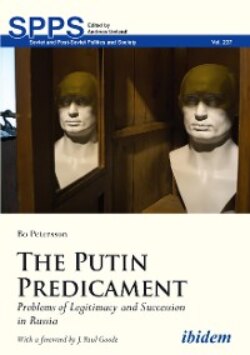Читать книгу The Putin Predicament - Bo Petersson - Страница 14
На сайте Литреса книга снята с продажи.
Charisma and routinization
ОглавлениеWeber famously argued that a political system that primarily relies on some type of legitimate authority other than the rational-legal one will have problems sustaining itself. For example, the traditional type of authority would be vulnerable in a situation of political succession when the family wherein traditional authority was nested suffered through death or incapacity. For its part, charismatic authority is the least durable of the three ideal types and is also highly elusive. This authority will be lost as a sitting political leader gradually exhausts their charisma and finds their trust among the electorate to be waning. The more reliant a political system is on legitimacy engendered by charismatic authority, the weaker it will be. Moreover, charismatic authority is not a given. It must be constructed continuously in the relations between the rulers and the ruled. This makes political succession in non-democratic settings particularly difficult. Even if a new incumbent can initially benefit from their predecessor’s charismatic authority, the link between the people and the leader needs to be forged anew to complete the transition. At the outset, the successor will probably have difficulties stepping out of their predecessor’s shadow and proving themself worthy of taking over the reins of executive power (Helms 2020).
Even if some research has suggested that a successor under favorable circumstances may manage to capitalize on and take over the predecessor’s charisma (Andrews-Lee 2019), most authors have argued that this is a difficult undertaking. One contemporary interpreter of Weber’s writings expressed the dilemma in the following terms:
… pure charisma is liable to collapse with the death of the idolized and beloved leader. In order to survive, it must reverse its valence and be channeled into rationalized secondary forms where leadership is inherited, appointed, or guaranteed by magical signs (Lindholm 2019).
Even if we may exclude the magical signs from the analysis, charisma is as we saw elusive, unpredictable, irrational, and based on emotions. It does not lend itself easily to the construction of a stable power base, as it may evaporate and desert its master. Charismatic authority may inspire and initiate the foundation of a political system but cannot guarantee its maintenance (Weber 1983: 169, Snyder 2018). It is revolutionary in character and can destroy or transform a political system but cannot sustain whatever it is that it lays the foundations for. Therefore, Weber anticipated that legitimacy primarily built on charismatic authority must be “routinized” to last (Weber 1983, Isaacs 2015). Through the process of routinization of charisma, the legitimacy of a political system can be sustained even after the exit of the current leader, Weber argued. Charismatic authority then transforms into some more durable type of legitimate authority, optimally of the rational-legal kind.
Routinization is never an easy process. The process takes time and is likely to be fraught with conflict as it progresses (Jarbawi and Pearlman 2007). Weber enumerated several strategies of routinization, three of which have continued relevance for how such a transformation can take place in political settings of today. These involve the incumbent’s handpicking of a successor, the leader’s staff appointing the successor, who will then have to gain popular acceptance, or going down the hereditary path through the identification of someone of the old leader’s kin as the successor (Weber 1983, Isaacs 2015). In the first case, the authority still initially rests on the predecessor’s charisma, whereas in the second, there are approaches to rational-legal authority. In the third case, charismatic authority will be routinized into traditional authority.
